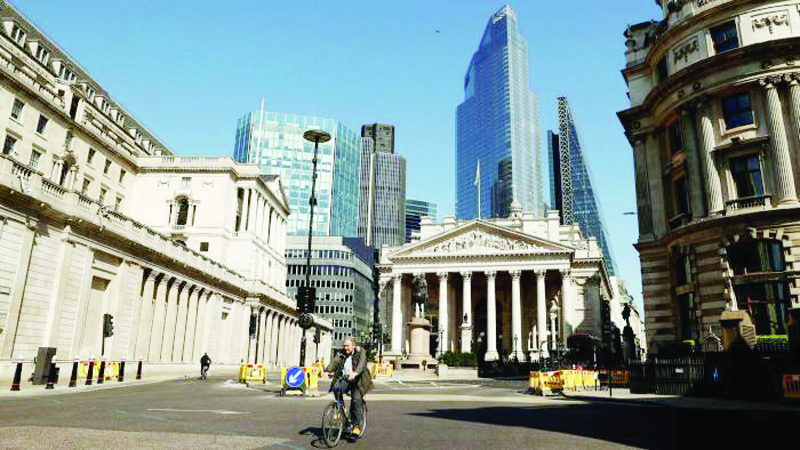

LONDON: The Bank of England yesterday said it had voted to keep its main interest rate at a record-low 0.1 percent, while predicting a less severe recession for the UK. The BoE added that its huge cash stimulus program used to prop up the British economy during the coronavirus pandemic would remain at £745 billion ($967 billion, 813 billion euros).
Britain's economy was expected to contract by 9.5 percent this year, the BoE said, downgrading its prior estimate of minus 14 percent. "Nonetheless, the recovery in demand takes time as health concerns drag on activity," the BoE said in minutes of its latest regular meeting that took place Tuesday. "GDP is not projected to exceed its level in 2019 Q4 until the end of 2021, in part reflecting persistently weaker supply capacity," it added. The pound meanwhile rallied against the dollar on the revision.
"The BoE was considerably more upbeat about the recovery than had been expected," noted City Index analyst Fiona Cincotta. "Upwardly revised growth forecasts, a more rapid recovery than initially feared and no tilting towards negative rates at this time has sent the pound surging towards $1.32."
The BoE also forecast that Britain's unemployment rate would shoot higher to around 7.5 percent by the end of the year. "Employment appears to have fallen since the COVID-19 outbreak, although this has been very significantly mitigated by the extensive take-up of support from temporary government schemes," the minutes said. "Surveys indicate that many workers have already returned to work from furlough, but considerable uncertainty remains about the prospects for employment after those support schemes unwind."
UK companies, from major retailers to airlines, are axing thousands of jobs despite government efforts to safeguard employment during the pandemic. The government is paying up to 80 percent of workers' wages under the state's furlough scheme, which finance minister Rishi Sunak has said must end in October. Replacing the scheme is a stimulus package worth £30 billion, including bonuses for companies retaining furloughed staff and offering apprenticeships amid fears of mass youth unemployment resulting from COVID-19 fallout.
Slower recovery
The Bank said that Britain's economy would probably take longer to get back to its pre-pandemic size than it previously thought, even if the scale of the hit this year might not be quite as bad.
However, the BoE's protections for 2020 are less grim than in May. Unemployment is expected to peak at 7.5 percent at the end of this year, almost double the most recent rate but lower than the BoE's previous estimate of just under 10 percent. The overall economy now looks on course for a 9.5 percent drop this year. That would be the worst performance in 99 years but less severe than a 14 percent plunge in the BoE's May scenario, which would have been the worst in more than three centuries.
Sterling hit its highest level against the dollar in five months and was up about 0.4 percent at 0720 GMT. British government bond yields also rose, as the BoE confirmed a further slowdown in the pace of bond purchases. The BoE said GDP was set to rebound by 9 percent next year, weaker than the 15 percent surge in May's scenario, and there were bigger risks of a slower recovery than a faster one.
The projections showed the BoE's Monetary Policy Committee thought inflation was likely to go below zero this month before returning to around the BoE's 2 percent target over the next couple of years and rising to 2.2 percent in 2023. - Agencies

